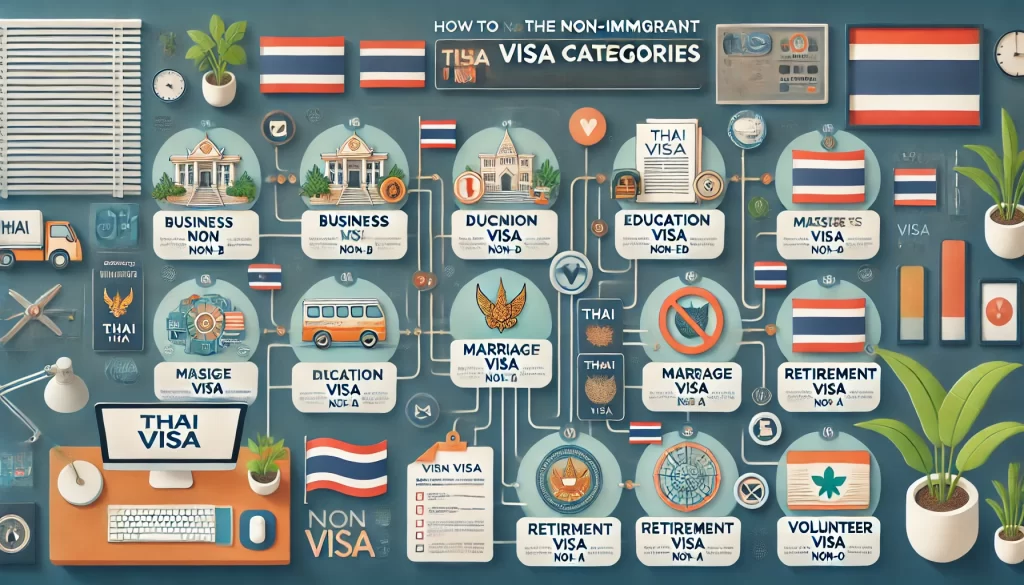Are you dreaming of living in Thailand but feeling overwhelmed by the visa options? 🇹🇭 You’re not alone. Many expats find themselves lost in the maze of Thai non-immigrant visa categories, unsure which path to take.
Imagine stepping off the plane in Bangkok, only to be turned away because you chose the wrong visa. Or picture yourself settled into your new Thai life, only to face unexpected legal issues due to visa misunderstandings. These scenarios are all too real for many foreigners. But don’t worry – there’s a solution. By understanding the ins and outs of Thai non-immigrant visas, you can avoid these pitfalls and make your Thai dream a reality.
In this comprehensive guide, we’ll walk you through the various Thai non-immigrant visa categories, from Business and Education to Retirement and Marriage visas. We’ll explore recent changes, demystify the application process, and even peek into the future of Thai visa policies. So, whether you’re planning to work, study, retire, or join your Thai spouse, let’s embark on this journey to navigate the Thai visa landscape with confidence. 🗺️💼📚🏖️💑
Understanding Thai Non-Immigrant Visa Categories
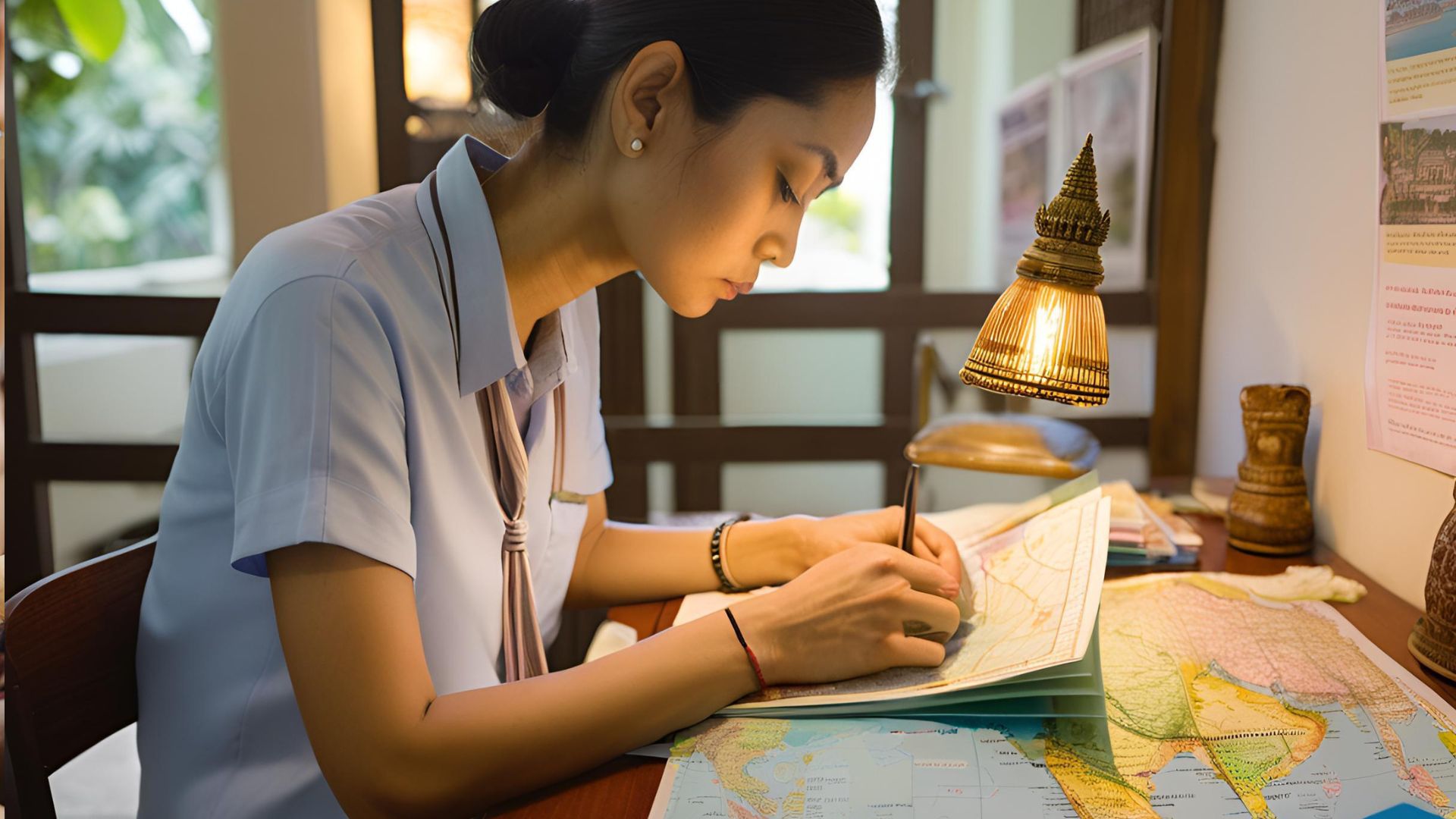
A. Overview of available categories
Thailand offers several non-immigrant visa categories to cater to different purposes of stay. The main categories include:
- Business Visa (Non-B)
- Education Visa (Non-ED)
- Retirement Visa (Non-O-A)
- Marriage Visa (Non-O)
- Diplomatic and Official Visas
Each category serves a specific purpose and has its own set of requirements. Let’s examine these categories in more detail:
| Visa Category | Purpose | Typical Duration |
|---|---|---|
| Non-B | Business, work, or investment | 90 days to 1 year |
| Non-ED | Study or educational activities | 90 days to 1 year |
| Non-O-A | Retirement for those aged 50+ | 1 year (renewable) |
| Non-O | Marriage to a Thai national | 90 days to 1 year |
| Diplomatic/Official | Diplomatic or government duties | Duration of assignment |
B. Key differences between categories
The main differences between these visa categories lie in their:
- Purpose of stay
- Duration of validity
- Eligibility requirements
- Application process
- Extension possibilities
For instance, while a Non-B visa allows you to work legally in Thailand, a Non-ED visa is strictly for educational purposes and does not permit employment. The Non-O-A retirement visa has age restrictions, whereas the Non-O marriage visa requires proof of relationship with a Thai national.
C. Eligibility criteria for each category
Each visa category has specific eligibility criteria:
-
Non-B Visa:
- Valid passport
- Proof of employment or business ownership in Thailand
- Relevant educational qualifications
-
Non-ED Visa:
- Acceptance letter from a recognized Thai educational institution
- Proof of financial means to support studies
-
Non-O-A Retirement Visa:
- Age 50 or above
- Proof of pension or sufficient funds in a Thai bank account
- No criminal record
-
Non-O Marriage Visa:
- Proof of marriage to a Thai national
- Financial requirements (income or funds in a Thai bank account)
-
Diplomatic/Official Visas:
- Official letter from the relevant government agency
- Diplomatic or official passport
Understanding these categories and their requirements is crucial for selecting the most appropriate visa for your stay in Thailand. Next, we’ll delve deeper into the Business Visa (Non-B), one of the most common visa types for foreigners working in Thailand.
Business Visa (Non-B)
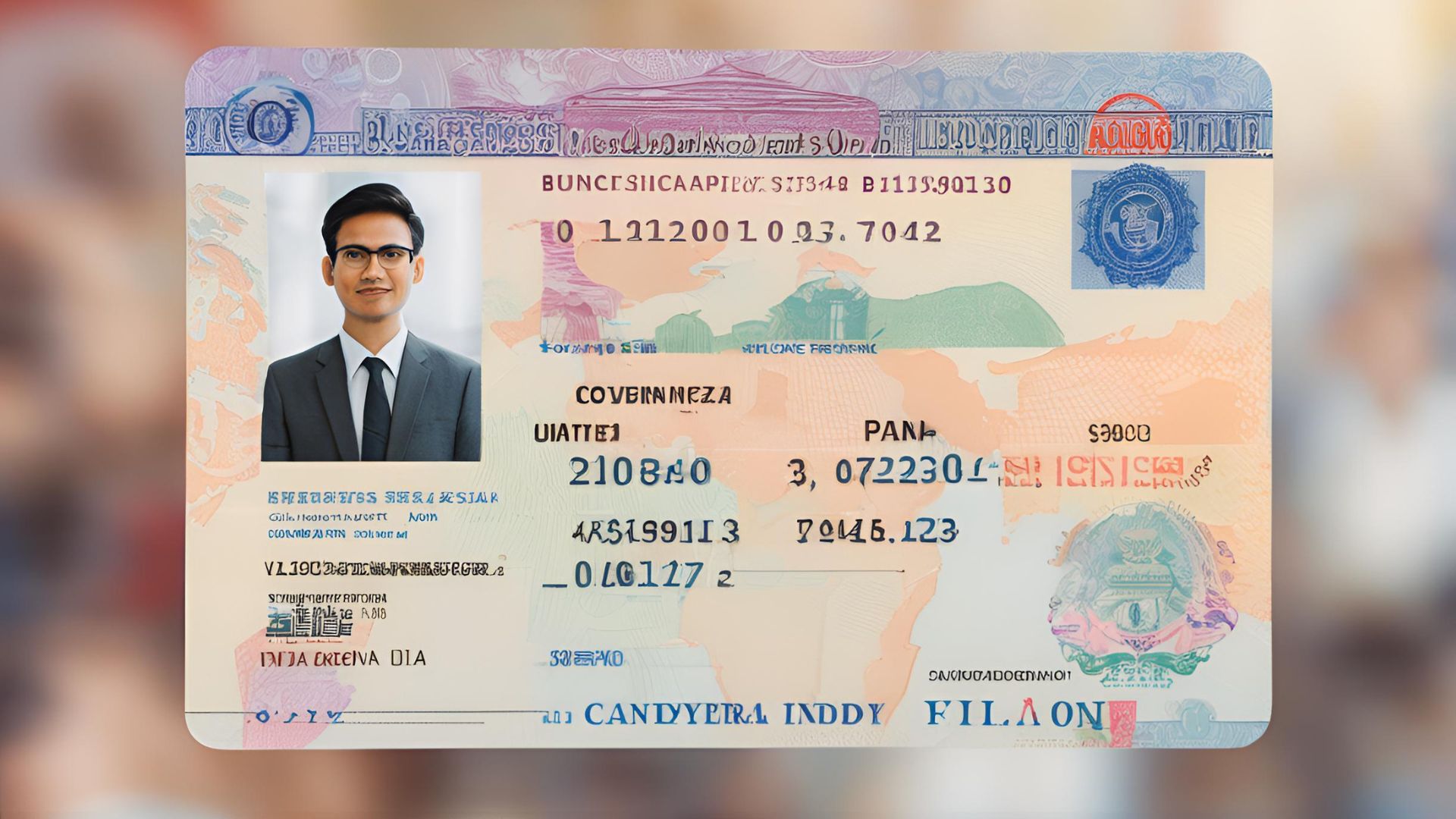
A. Purpose and benefits
The Business Visa (Non-B) is designed for foreigners seeking to work or conduct business activities in Thailand. Its primary purpose is to facilitate legitimate business operations while ensuring compliance with Thai labor laws.
Benefits of the Non-B visa include:
- Legal employment in Thailand
- Extended stay periods (up to one year, renewable)
- Eligibility for work permit application
- Ability to open Thai bank accounts
- Possibility of long-term residency
B. Required documents
To apply for a Non-B visa, you’ll need to prepare the following documents:
- Passport (valid for at least 6 months)
- Completed visa application form
- Recent passport-sized photographs
- Letter of invitation from a Thai company
- Company registration documents
- Financial statements of the inviting company
- Applicant’s resume and educational certificates
- Police clearance certificate from home country
C. Application process
The Non-B visa application process typically involves these steps:
- Gather required documents
- Submit application at Thai embassy or consulate
- Pay visa fee
- Attend interview (if required)
- Wait for visa processing (usually 3-5 working days)
- Collect passport with visa
| Step | Timeframe | Notes |
|---|---|---|
| Document preparation | 1-2 weeks | Varies based on document availability |
| Application submission | 1 day | In-person at embassy/consulate |
| Visa processing | 3-5 days | Can be expedited for additional fee |
| Visa collection | 1 day | In-person or via courier service |
D. Work permit requirements
Once in Thailand with a Non-B visa, you must obtain a work permit before starting employment. Key requirements include:
- Valid Non-B visa
- Job offer from a Thai company
- Company’s business registration documents
- Educational certificates and professional licenses
- Health certificate from a Thai hospital
- Proof of address in Thailand
Now that we’ve covered the Business Visa category, let’s explore another common non-immigrant visa option: the Education Visa.
Education Visa (Non-ED)

A. Types of educational programs covered
The Education Visa (Non-ED) in Thailand caters to a diverse range of educational pursuits. Here’s a breakdown of the programs typically covered:
- Language courses (Thai, English, Chinese, etc.)
- University degree programs
- Short-term study programs
- Internships and training programs
- Religious studies
| Program Type | Duration | Common Institutions |
|---|---|---|
| Language courses | 3-12 months | Language schools, Universities |
| University degrees | 1-4 years | Public and private universities |
| Short-term studies | 1-6 months | Vocational schools, Specialized institutes |
| Internships | 3-12 months | Companies, NGOs |
| Religious studies | 3-12 months | Temples, Religious organizations |
B. Application requirements
To obtain a Non-ED visa, applicants must meet specific criteria and provide necessary documentation:
- Acceptance letter from a recognized Thai educational institution
- Proof of sufficient funds (typically 20,000 THB per month of stay)
- Valid passport with at least 6 months validity
- Completed visa application form
- Recent passport-sized photographs
- Criminal background check (for some programs)
- Health insurance coverage
C. Visa extension possibilities
Non-ED visa holders can extend their stay under certain conditions:
- Ongoing enrollment in the educational program
- Satisfactory academic progress
- Compliance with immigration laws and regulations
Extensions are typically granted for 90 days to 1 year, depending on the program length and type. Students must apply for extensions at least 30 days before their current visa expires.
Now that we’ve covered the Education Visa category, let’s explore another popular option for long-term stay in Thailand: the Retirement Visa.
Retirement Visa (Non-O-A)

Age and financial requirements
To obtain a Thai Retirement Visa (Non-O-A), applicants must meet specific age and financial criteria:
- Minimum age: 50 years old
- Financial requirements:
- 800,000 THB in a Thai bank account, or
- Monthly income of at least 65,000 THB, or
- A combination of savings and income totaling 800,000 THB annually
| Requirement Type | Minimum Amount |
|---|---|
| Savings in Thai bank | 800,000 THB |
| Monthly income | 65,000 THB |
| Combined annual | 800,000 THB |
Healthcare considerations
Retirees must meet certain health-related requirements:
- Proof of health insurance coverage
- Medical certificate showing good health
- No prohibited diseases (e.g., leprosy, tuberculosis)
Reporting obligations
Retirement visa holders have ongoing responsibilities:
- 90-day reporting to immigration
- Annual visa renewal
- Notifying authorities of address changes
Failure to comply with these obligations may result in fines or visa cancellation. Now that we’ve covered the Retirement Visa requirements, let’s explore the Marriage Visa (Non-O) category, which is another popular option for long-term stay in Thailand.
Marriage Visa (Non-O)

A. Eligibility for foreign spouses
To qualify for a Thai Marriage Visa (Non-O), foreign spouses must meet specific criteria:
- Be legally married to a Thai national
- Provide a valid marriage certificate
- Have a clean criminal record
- Hold a valid passport with at least 6 months remaining validity
B. Financial requirements
Financial stability is crucial for obtaining a Marriage Visa. Applicants must demonstrate:
| Requirement | Amount |
|---|---|
| Minimum monthly income | 40,000 THB |
| OR Bank deposit | 400,000 THB |
These funds must be maintained for at least 2 months prior to application and throughout the visa duration.
C. Visa renewal process
The Marriage Visa renewal process involves:
-
Gather required documents:
- Completed TM.7 form
- Recent photographs
- Valid passport
- Marriage certificate
- Proof of address in Thailand
- Financial statements
-
Submit application at local immigration office
-
Pay renewal fee
-
Undergo interview (if required)
-
Receive visa extension stamp
Renewals are typically granted for one year. It’s advisable to start the renewal process at least 30 days before the current visa expires.
With the Marriage Visa secured, foreign spouses can enjoy extended stays in Thailand. However, it’s important to note that this visa doesn’t automatically grant work privileges. For those seeking employment, additional steps are necessary to obtain a work permit.
Diplomatic and Official Visas
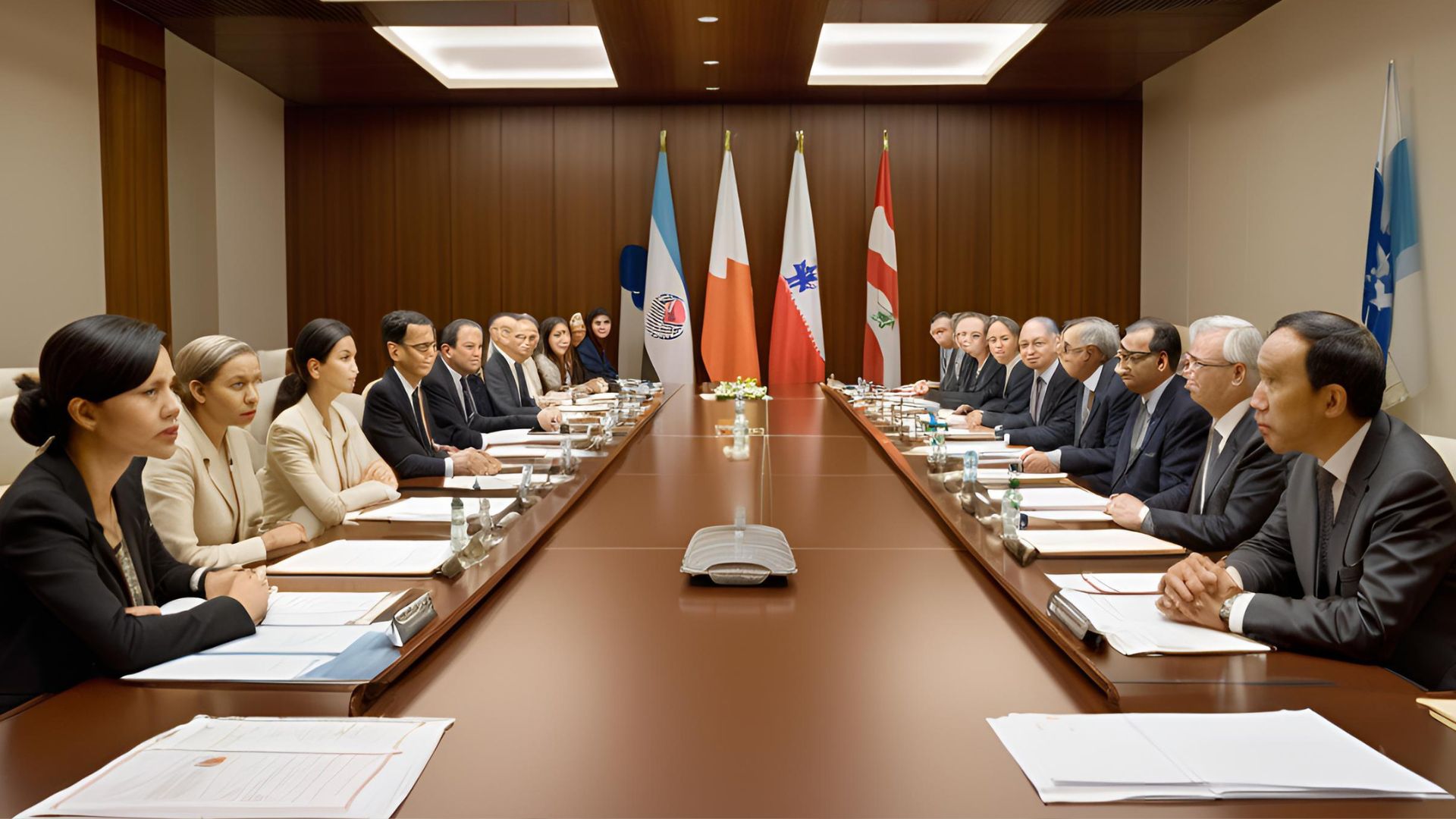
A. Qualifying positions
Diplomatic and Official visas in Thailand are reserved for specific individuals representing their countries or international organizations. Qualifying positions include:
- Ambassadors and embassy staff
- Consular officers
- Representatives of international organizations (e.g., UN, WHO, World Bank)
- Government officials on official missions
- Military personnel on official duties
| Position | Description | Duration |
|---|---|---|
| Ambassadors | Highest-ranking diplomatic representatives | Up to 4 years |
| Consular Officers | Provide consular services to citizens | 2-3 years |
| Int’l Org. Reps | Represent global entities in Thailand | Project-based |
| Gov’t Officials | On temporary assignments or missions | Mission duration |
| Military Personnel | Engaged in official military duties | Assignment length |
B. Application through proper channels
To obtain a Diplomatic or Official visa, applicants must follow a specific process:
- Official request from the sending government or organization
- Submission of documents to the Thai Ministry of Foreign Affairs
- Approval from the Thai government
- Issuance of the visa through the Royal Thai Embassy or Consulate
C. Special privileges and considerations
Holders of Diplomatic and Official visas enjoy certain benefits:
- Exemption from regular immigration procedures
- Extended stay periods without renewal requirements
- Duty-free importation of personal effects
- Tax exemptions on official income
- Access to diplomatic lanes at airports and border crossings
These privileges ensure that diplomatic and official personnel can carry out their duties efficiently while in Thailand. As we move forward, let’s explore the general application process for Thai non-immigrant visas, which differs significantly from the specialized procedures for diplomatic and official visas.
Navigating the Application Process
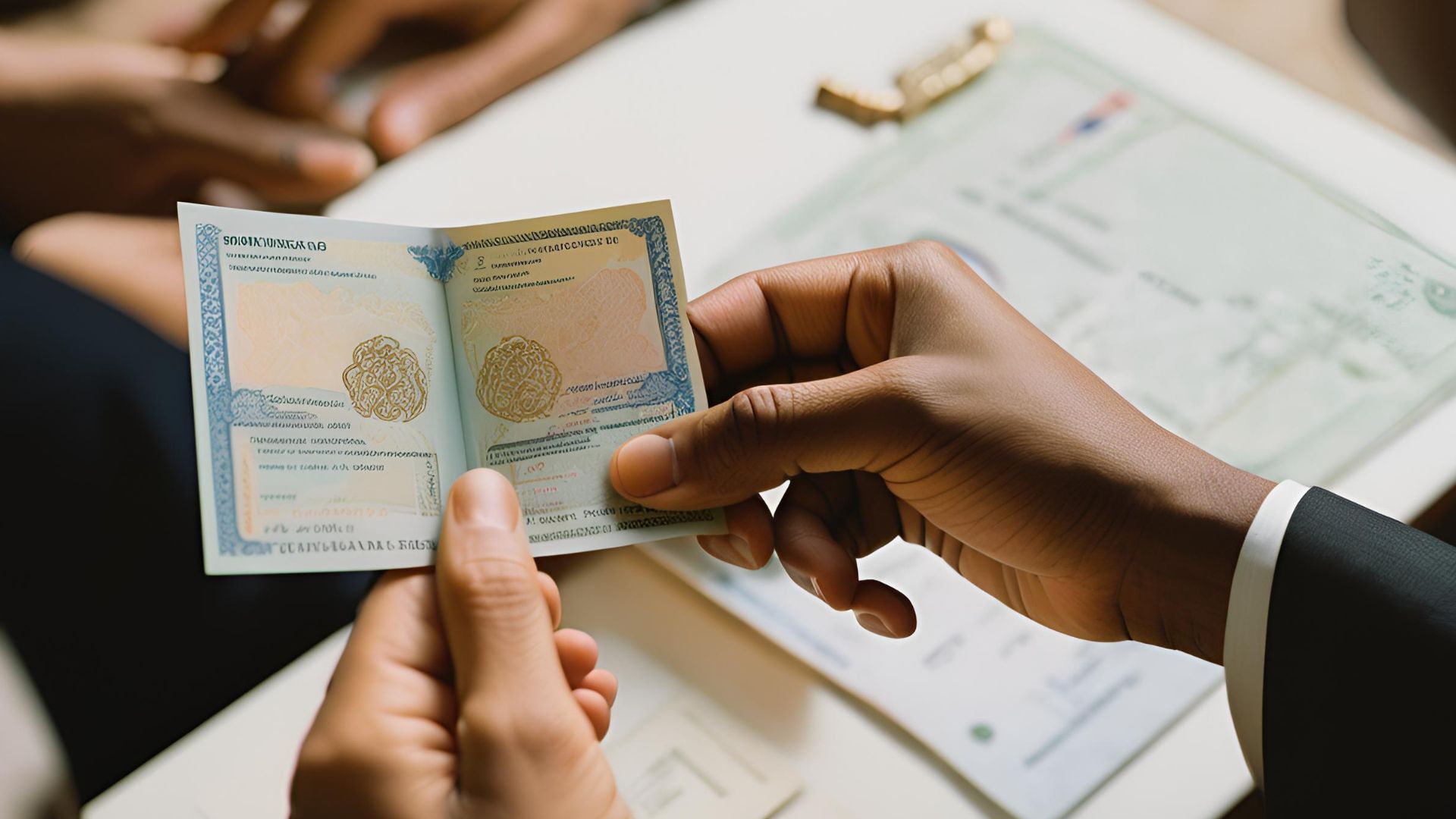
Where to apply
When applying for a Thai Non-Immigrant Visa, you have two main options:
- Thai Embassy or Consulate in your home country
- Thai Immigration Bureau (for certain visa types and extensions)
Here’s a comparison of the two options:
| Application Location | Pros | Cons |
|---|---|---|
| Thai Embassy/Consulate | – More visa categories available<br>- Often faster processing times | – May require travel if not near your location<br>- Limited appointment availability |
| Thai Immigration Bureau | – Convenient for those already in Thailand<br>- Can handle extensions and certain visa changes | – Limited visa categories<br>- Longer processing times in some cases |
Common pitfalls to avoid
To ensure a smooth application process, be mindful of these common mistakes:
- Incomplete documentation
- Incorrect visa category selection
- Outdated information on requirements
- Failure to meet financial criteria
- Overlooking visa validity periods
Processing times and fees
Processing times and fees vary depending on the visa category and where you apply. Here’s a general overview:
- Processing time: 3-5 business days (can be longer for certain categories)
- Fees: Range from 2,000 to 5,000 THB (approx. $60-$150 USD)
Visa extension procedures
Once in Thailand, you may need to extend your visa. The process typically involves:
- Visiting your local immigration office
- Submitting required documents (passport, photos, application form)
- Paying the extension fee
- Waiting for approval (usually same-day or within a week)
Remember to start the extension process before your current visa expires to avoid overstay penalties.
With this understanding of the application process, let’s explore recent changes and future outlook for Thai Non-Immigrant Visas.
Recent Changes and Future Outlook
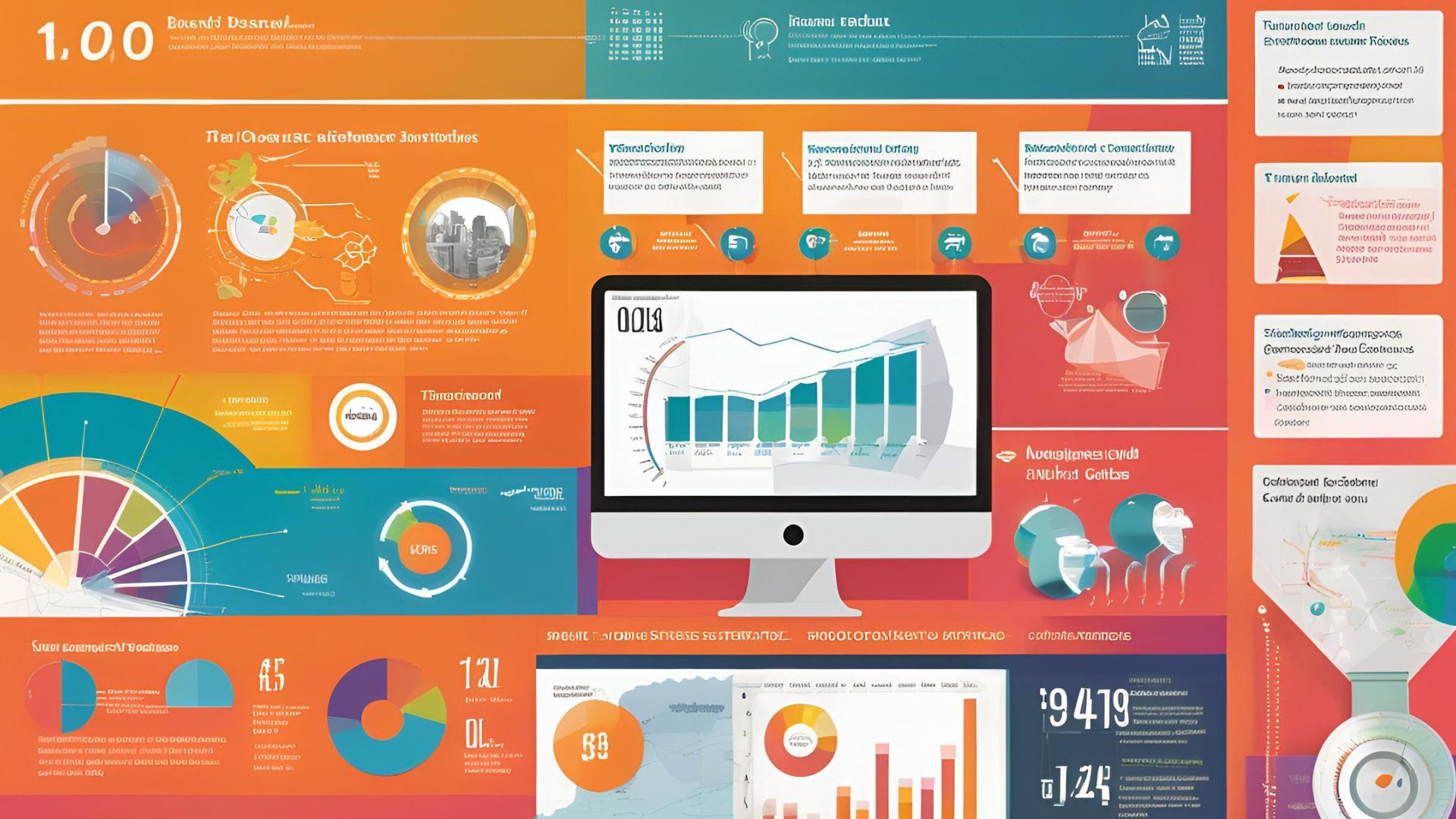
Impact of COVID-19 on visa policies
The COVID-19 pandemic has significantly impacted Thai visa policies, introducing both temporary measures and long-term changes. Here’s a breakdown of the key impacts:
| COVID-19 Impact | Description |
|---|---|
| Visa Extensions | Automatic extensions for certain visa types to prevent overstays |
| Entry Restrictions | Temporary bans on non-essential travel and stricter entry requirements |
| Special Tourist Visa | Introduction of a new long-stay tourist visa to boost tourism |
| Digital Nomad Visa | Consideration of a new visa category for remote workers |
Potential upcoming changes
As Thailand adapts to the post-pandemic world, several changes to the visa system are being considered:
- Streamlined application processes
- Extended validity periods for certain visa types
- Introduction of new visa categories for emerging professions
- Enhanced integration with digital platforms for visa management
Resources for staying updated
To stay informed about the latest changes in Thai visa policies:
- Official Thai Immigration Bureau website
- Royal Thai Embassy websites in your country
- Reputable visa service providers
- Expat forums and social media groups
It’s crucial to rely on official sources and verify information, as visa regulations can change rapidly. Regular checks of these resources will help ensure compliance with the latest requirements and take advantage of new opportunities in Thailand’s evolving visa landscape.
Navigating the Thai Non-Immigrant Visa system can seem daunting at first, but understanding the various categories and their requirements is crucial for a successful application. From Business and Education visas to Retirement and Marriage visas, each category caters to specific needs and purposes. The application process, while detailed, becomes manageable with proper preparation and attention to recent changes in regulations.
As Thailand continues to evolve its visa policies, staying informed about updates and potential future changes is essential. Whether you’re planning to work, study, retire, or join a spouse in Thailand, carefully selecting the appropriate visa category and following the application guidelines will pave the way for a smooth transition into Thai society. Remember to consult official sources and consider seeking professional advice to ensure your visa journey aligns with your long-term goals in the Land of Smiles.

